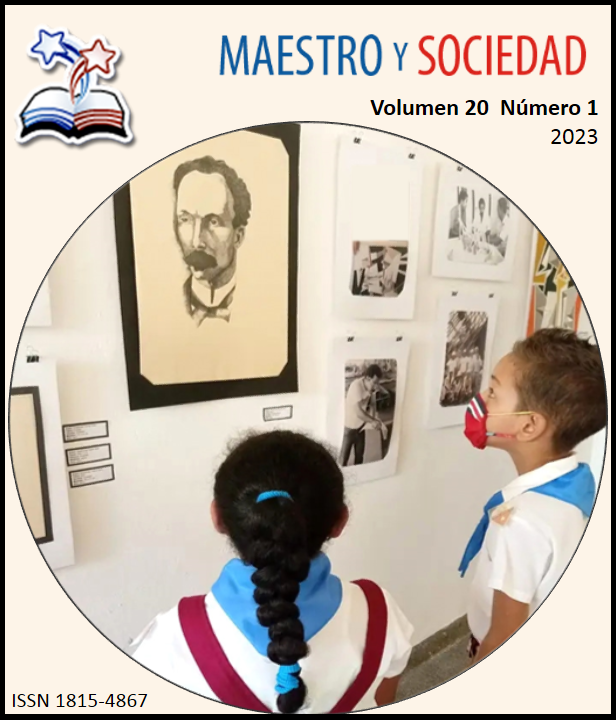Design methodology and impact of thematic blogs as an educational tool in professional training
Design methodology and impact of thematic blogs as an educational tool in professional training
Keywords:
thematic blog, Mechatronic, design, educational resource, teaching-learningAbstract
Introduction: This paper proposes a methodology for the design of thematic blogs. For the development of the methodology, a thematic blog is carried out as an educational resource for the teaching of Mechatronics.
Materials and methods: The logical sequence for the design of thematic blogs is established and the selection of the theme and aspects to be taken into account for the selection of the contents and final structure of the blog are addressed. The validation of the impact of the proposal is carried out from surveys to students in the Mechanical Engineering career.
Results: The thematic blog, designed, is used as complementary material of the subject to consolidate the knowledge of the students, thus strengthening the teaching-learning process. The results of the study demonstrated the positive impact of using thematic blogs as a tool in the training of professionals in higher education.
Discussion: the Blog constitutes a potential educational tool whose main value lies in the fact that teachers and students use creativity in order to generate learning and raise the quality of teaching.
Conclusions: The proposed methodology allows establishing the sequence of work when preparing a thematic blog.
References
Arraigada C. G. y Llancao, L. J. (2006). ‘WordPress’ y la creación de un sitio Web dinámico: metodología de instalación y puesta en marcha. Serie Bibliotecología y Gestión de Información.
Cabero, A. J., López, M. E. y Ballesteros, R. C. (2009). Experiencias universitarias innovadoras con blogs para la mejora de la praxis educativa en el contexto europeo. Revista de Universidad y Sociedad del Conocimiento, 6(2), 1-14.
Cuerva, J. (2007). La nueva Web social: blogs, wikis, RSS y marcadores sociales. Observatorio Tecnológico de Educación. Instituto de Tecnologías Educativas. http://observatorio.cnice.mec.es/modules.php?op=modload&name=News&file=article&sid=529
Fumero, A. (2005). Un tutorial sobre blogs. El abecé del universo blog. (s.e.).
Gallego, A. (2006). Guías fáciles de las TIC – Blogs. Colegio Oficial de Ingenieros de la Telecomunicación. http://www. Coit.es/ pub / ficheros / blogs_425672d7.pdf
González, S. R. y García, M. F. (2009). El blog en la docencia universitaria, ¿una herramienta útil para la convergencia europea? Relada, 3(2), 135-144.
Huffaker, D. (2005). The educated blogger: Using weblogs to promote literacy in the classroom. AACE Journal, 13(2), 91-98.
Martínez, A. J. y Curbeira, H. E. (2014). El blog, una herramienta de la web para potenciar el proceso docente educativo en las carreras de las Ciencias Médicas. Revista Médica Electrónica, 36(3). http://www.revmatanzas.sld.cu/revista%20medica/ano%202014/vol3%202014/tema14.htm.
Orihuela, J. L. y Santos, M. L. (2004). Los weblogs como herramienta educativa: Experiencias con bitácoras de alumnos. Quaderns Digitals, (35), 1-7.
Sáez L., J. M. (2010). Utilización de las TIC en el proceso de enseñanza aprendizaje, valorando la incidencia real de las tecnologías en la práctica docente. Revista Docencia e Investigación, (20), 183-204.
Seoane, G. C. (2007). Weblogs en bibliotecas ¿y por qué no? Educación y Biblioteca, (161), 113-119.
Secretaría de Estado de Universidades e Investigación. (SEUI) (2007). Modelos de enseñanza y aprendizaje presentes en los usos de plataformas e-learning en universidades españolas y propuestas de desarrollo: Programa de Estudios y Análisis. Universidad Santiago de Compostela.
Tamayo R., Y. y Ruíz M., A. (2016). Los blogs educativos como recurso didáctico en el proceso de enseñanza–aprendizaje de la historia. REDIPE Boletín Virtual, 5(9). https://revista.redipe.org/index.php/1/article/view/111/0
Torres, V. (2009). ¿Por qué las bitácoras electrónicas (blogs) se usan poco para estudiar ciencias físico‐ matemáticas? EDUTEC. Revista Electrónica de Tecnología Educativa, (29).
Downloads
Published
How to Cite
Issue
Section
License
Copyright (c) 2023 Elizabeth Larrondo Pons, Gustavo Cervantes Montero, Angel Sánchez Roca

This work is licensed under a Creative Commons Attribution-NonCommercial-NoDerivatives 4.0 International License.
This journal provides immediate open access to its content, based on the principle that offering the public free access to research helps a greater global exchange of knowledge. Each author is responsible for the content of each of their articles.



























 Universidad de Oriente
Universidad de Oriente 